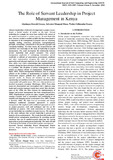| dc.description.abstract | Leadership is believed to be important to project success despite a limited number of studies on the topic. Servant leadership, for example, has never been studied in the context of the project environment or project success. Servant leadership does, however, include a number of skills that have been found to be important to the management of projects such as: Listening,empathy, healing, awareness, persuasion, conceptualization, foresight, stewardship, commitment to the growth of people and community building. For that reason, the research herein will contribute new knowledge to the study of leadership in project management. The study investigated the relationship between servant leadership and project outcomes. The project management profession is undergoing tremendous growth worldwide as officials of corporations, governments, academia and other organizations recognize the value of common approaches and educated employees for the execution of projects (Ives, 2005). Ives (2005) acknowledged that implementation of strategic change has been a business problem for decades and still is a problem. The discipline of project management is a key strategy to manage change in organizations (Kloppenborg & Opfer, 2002). Project management techniques may be a partial
solution to the problem of implementing of strategic change. Construction projects globally have often failed to achieve expected results. In Kenya, for instance we have been experiencing cost and time overruns on projects which are further compounded with quality issues. This even when professors are involved in projects execution (Muchungu, 2012). Even when teams are disassembled and reassembled with a different team leader and or project manager results have varied. Since the latter years of the 1980s, the links between the implementation of change and project management has been strengthened (Ives, 2005). Organizational systems are open, complex, and political,creating a greater level of uncertainty and contributing to an unstable and changing project environment (Ives, 2005; Thomas & Bendoly, 2009). The high level of uncertainty and change challenges traditional systematic approaches to project management. The emphasis of the traditional approach was more on project processes, tools and techniques and less on the leadership of projects. This study determines to what extent servant leadership can contribute to project success. The outcome of this study indicates that servant- leadership is present in a majority of successful projects. The results from this study could benefit project management practitioners by providing specific constructs that can be applied towards improving the current approaches to project management leadership. The study will add to the body of knowledge on leadership in project management.
Keywords: Servant leadership, Project Management, Project Success, Project Leaders, Project execution, Project Human Resources. | en_US |

